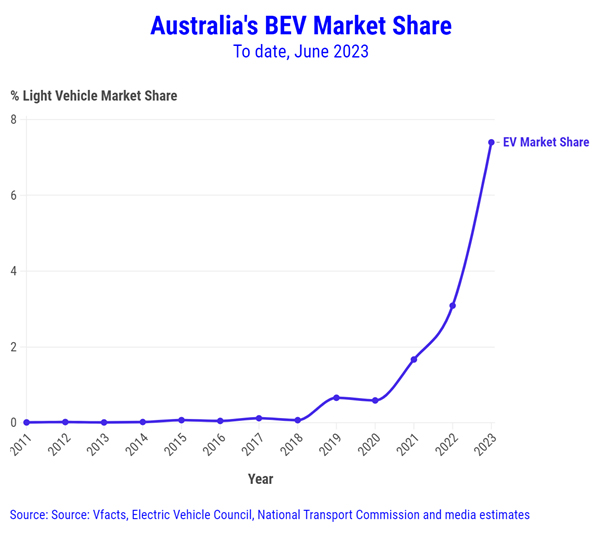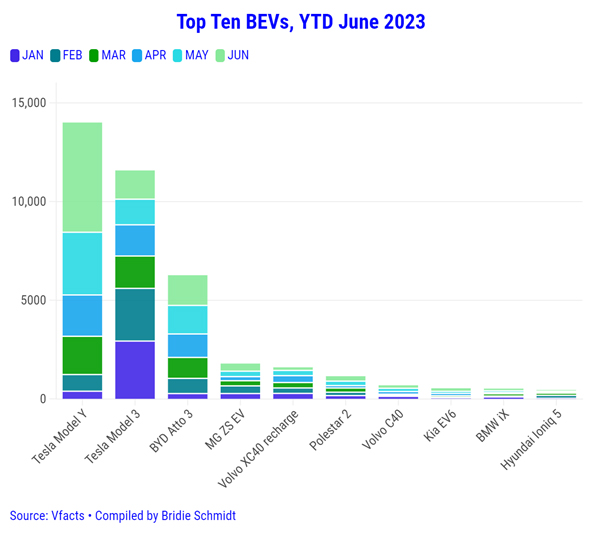

This website uses cookies to improve the user experience. We use cookies in accordance with our NRMA Group Cookie Policy.
This website uses cookies to improve the user experience. We use cookies in accordance with our NRMA Group Cookie Policy.

Electric vehicles (EVs) hit another record milestone in the latest car sales figures from VFACTS, with Tesla selling more than 25,000 vehicles (7018 in June) to finish in sixth position for the month and eight for the first half of 2023 in overall brand sales.
Year-to-date, electric vehicle sales have quadrupled compared to 2022, with 43,092 new pure electric vehicles landing in the first half of 2023 – representing a 7.4 per cent market share. This slice of new-car sales is made more impressive by June 2023 being the strongest since 2018.
It’s a monumental leap, indicating the technology adoption curve is in full swing for electrification of transport. In June 2022, just shy of 10,000 pure electric vehicles had sold for the first half of the year – or just 1.8 per cent of overall sales.
At the half-year mark, 25,577 – or around 60 per cent – of all EVs sold wore a Teslas badge as the electric car specialist continued to flex its EV supply chain dominance. Because of this, EVs also outsold hybrids again by around 2000 units.
Related: EV sales in May 2023
EVs may have also claimed a greater share of the overall car market had it not been for a recovery in vehicle supply from certain quarters of the combustion engine market.
That said, Toyota is reportedly still experiencing supply chain issues and bottlenecks with sales of its HiLux and RAV4 down 19 and 33 per cent respectively in the month of June.
Booming car sales seen this June (where 124,926 total vehicles were sold, up 25 per cent from last year) are not expected to last, however. Industry experts are predicting sales to slump as interest rate hikes and cost-of-living concerns take their toll.
Whether this trend would extend to electric cars remains to be seen, however, especially following the recent introduction of two electric car models priced under $40,000 in Australia. It’s likely there will soon be more interest in EVs in the lower end of the market.

Perhaps the biggest story in June EV sales was the Tesla Model Y electric SUV knocking the Ford Ranger – which has historically contested with the Toyota HiLux for the top spot – off its perch to become the second-best-selling vehicle and the top-selling passenger car in Australia overall with 5560 sales.
The Model Y also overtook the wildly popular Toyota RAV4 to become the top-selling passenger vehicle (when Toyota HiLux and Ford Ranger light commercial vehicles are excluded) in June.
Likewise, the Tesla Model 3 was the best seller in passenger car sales, selling 1458 units – a 50 per cent increase on the Toyota Camry.
The BYD Atto 3 claimed the number two spot for EV sales with 1523 sales. Year-to-date, BYD has sold 6196 of its Atto 3 medium SUV in Australia – a promising sign for its upcoming Dolphin electric hatchback, which launched in late June.
Coming in at fourth for EVs was the MG ZS EV, with 387 sold.
Other notable players in the all-electric arena in June were Polestar, which delivered 251 Polestar 2s to new customers, the Volvo XC40 Recharge (156), Kia EV6 (154), Volvo C40 (151), Kia e-Niro (125), Mercedes-Benz EQA (125) and BMW iX (105).

While Australia’s sales may be a tiny portion of Tesla’s global sales, they certainly echo the EV maker’s ongoing trajectory.
The electric vehicle giant reported it had produced a staggering 479,700 EVs in Q2 2023 (with 466,140 already delivered), setting new highs for both production and sales.
Together with production figures from the first half of 2023 (440,808), Tesla manufactured an impressive 920,508 EVs, putting it on a solid path to meet, and possibly exceed, its ambitious target of 2 million EVs for the year.
The popular Model 3 and Model Y accounted for a whopping 96 per cent of Tesla's production, with the luxury Model S and X (models pulled from the Australian line-up earlier this year) making up the remaining 4 per cent.
Q2 sales skyrocketed, up 10 per cent from Q1's record, and achieving a hefty 83 per cent year-on-year increase from Q2 2022.
If Tesla maintains this momentum, it is set to produce around 542,000 EVs in Q3 and 612,500 in Q4, pushing the total 2023 production numbers to an estimated 2.1 million.
This would surpass Tesla's stated goal of 1.8 to 2 million a year, representing an annual growth rate of about 60 per cent and exceeding Tesla's long-term target of 50 per cent annual production growth.
In terms of Q2 trailing 12-month figures, Tesla sales grew 47 per cent in 2022-23, 58 per cent in 2021-22, and 82 per cent in 2020-21. Impressive growth, considering the pandemic and financial challenges of the past few years.